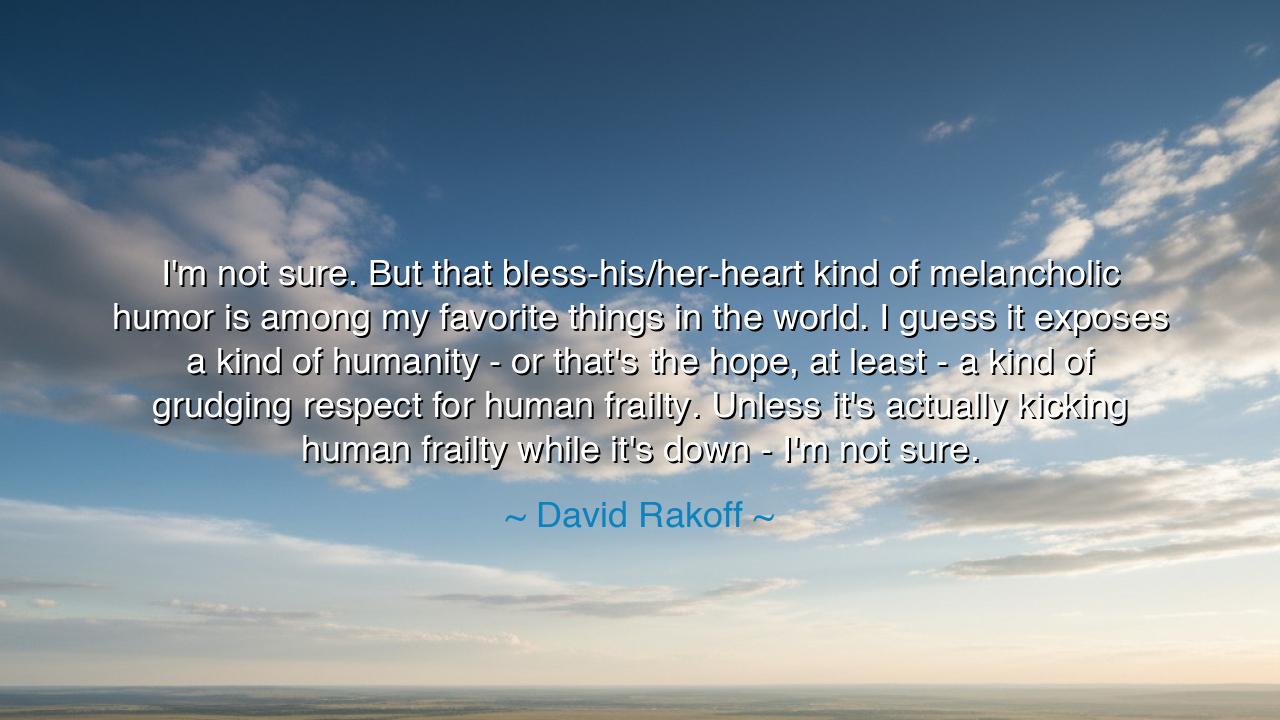
I'm not sure. But that bless-his/her-heart kind of melancholic
I'm not sure. But that bless-his/her-heart kind of melancholic humor is among my favorite things in the world. I guess it exposes a kind of humanity - or that's the hope, at least - a kind of grudging respect for human frailty. Unless it's actually kicking human frailty while it's down - I'm not sure.






In the delicate balance of human existence, there exists a form of humor that transcends mere laughter—a humor that walks the line between the tragic and the absurd, the human and the divine. David Rakoff, in his reflection on this unique brand of humor, says, "I'm not sure. But that bless-his/her-heart kind of melancholic humor is among my favorite things in the world. I guess it exposes a kind of humanity—or that's the hope, at least—a kind of grudging respect for human frailty. Unless it's actually kicking human frailty while it's down—I'm not sure." These words, brimming with both insight and uncertainty, touch upon the fragility of human life—the suffering, the struggles, and yet, the warmth that humor can offer, even in the midst of it all. It is a humor that does not shy away from weakness but embraces it, finding in the most sorrowful moments the resilience of the human spirit.
The ancients knew that humor, when wielded wisely, could expose profound truths about the human condition. Socrates, though often seen as the embodiment of wisdom, did not hesitate to use irony and humor to reveal the contradictions in human thinking. His method of dialogue, often laced with humor, was not intended to mock, but to make others reflect on their own folly and inconsistencies. In a similar vein, Rakoff’s melancholic humor does not seek to ridicule human frailty but to acknowledge it with a kind of compassion. It is a humor that gently holds up a mirror, showing us our vulnerability, while also inviting us to laugh at our own imperfections, thus revealing our shared humanity. This is not a mockery of human weakness but a grudging respect for it, for in it, we find our shared struggles and our strength to endure.
Consider the great writers and thinkers of ancient Greece, like Aristophanes, who used humor to both entertain and criticize. His plays were filled with sharp satire, but beneath the laughter, there was often a sorrowful truth about the nature of society, power, and the absurdity of life. Aristophanes’ characters were deeply flawed, and through their comedic actions, the audience was invited to see themselves not as perfect beings, but as creatures capable of both greatness and absurdity. Similarly, Rakoff’s humor, laced with melancholy, reflects a deep understanding that life—with all its trials and errors—is not to be ridiculed but embraced with understanding. By laughing at human frailty, we acknowledge its reality and its place in the grand human story.
Socrates taught that wisdom was found not in the avoidance of human weakness, but in the acceptance of it. To know oneself, he said, is to understand both the strength and the weakness that lie within. This acceptance of human imperfection is central to Rakoff’s view of humor. In his eyes, humor is not about turning a blind eye to life’s flaws but about acknowledging them fully, with both grace and resilience. Rakoff’s humor, steeped in melancholy, carries with it the weight of experience—the understanding that life is often disappointing, and yet it is through these disappointments that we grow, laugh, and find connection.
Consider the tragic yet comic story of King Lear, written by Shakespeare. The old king, in his folly, divides his kingdom between his two treacherous daughters, and yet his madness—while a source of tragedy—also carries moments of humor. His fool, a figure both wise and absurd, speaks truths that echo through the ages, reminding Lear and the audience of the folly of human pride. In the play, humor is not a tool for mere laughter, but a means of reflection on the absurdity of life. Rakoff’s humor, like Shakespeare’s, invites us to find truth in human frailty, to laugh at our own flaws while also mourning the harshness of existence.
From Rakoff’s words, we take a lesson in humility and compassion. The ability to see humor in the melancholy of life is a profound gift—it requires a certain wisdom, the ability to balance the sorrowful with the hopeful. It is not about denying the harshness of life but about accepting it with grace, finding meaning in the most difficult of moments. Rakoff’s humor does not seek to uplift only the happy or the perfect but to embrace the messiness of human existence, seeing in it a form of shared dignity. To laugh at life’s imperfections is not to diminish them, but to honor them as part of the great journey we all share.
In our own lives, we must learn to embrace this balance. We should not shy away from life’s difficulties, but rather, we must recognize them for what they are: a part of the grand tapestry of human experience. Let us learn to find humor in our struggles, not to diminish them, but to acknowledge that they are as much a part of us as our joys. By doing so, we can gain the strength to face whatever comes our way, knowing that the human experience—full of contradictions and imperfections—is something we all share. Rakoff’s wisdom teaches us that melancholic humor, like all great humor, is a celebration of the human spirit, in all its fragile, flawed, and beautiful forms.






AAdministratorAdministrator
Welcome, honored guests. Please leave a comment, we will respond soon